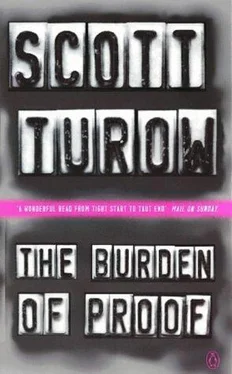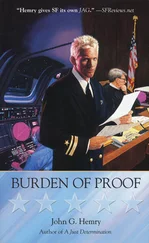Scott Turow - The Burden of Proof
Здесь есть возможность читать онлайн «Scott Turow - The Burden of Proof» весь текст электронной книги совершенно бесплатно (целиком полную версию без сокращений). В некоторых случаях можно слушать аудио, скачать через торрент в формате fb2 и присутствует краткое содержание. Жанр: Детектив, на английском языке. Описание произведения, (предисловие) а так же отзывы посетителей доступны на портале библиотеки ЛибКат.
- Название:The Burden of Proof
- Автор:
- Жанр:
- Год:неизвестен
- ISBN:нет данных
- Рейтинг книги:3 / 5. Голосов: 1
-
Избранное:Добавить в избранное
- Отзывы:
-
Ваша оценка:
- 60
- 1
- 2
- 3
- 4
- 5
The Burden of Proof: краткое содержание, описание и аннотация
Предлагаем к чтению аннотацию, описание, краткое содержание или предисловие (зависит от того, что написал сам автор книги «The Burden of Proof»). Если вы не нашли необходимую информацию о книге — напишите в комментариях, мы постараемся отыскать её.
The Burden of Proof — читать онлайн бесплатно полную книгу (весь текст) целиком
Ниже представлен текст книги, разбитый по страницам. Система сохранения места последней прочитанной страницы, позволяет с удобством читать онлайн бесплатно книгу «The Burden of Proof», без необходимости каждый раз заново искать на чём Вы остановились. Поставьте закладку, и сможете в любой момент перейти на страницу, на которой закончили чтение.
Интервал:
Закладка:
This would go badly with the government. Quite badly. He had been warning Dixon against this for months now, to no apparent avail. Dixon was shrewd enough to recognize that even if the prosecutors could not figure out what he had done with the money, they would have a case if they could prove he had stolen it-and proof that he controlled this Wunderkind account would suffice. But it was a desperate response to destroy the documents. The government could barely avoid proving Dixon was responsible. As Margy said, there was probably no other person in the company who could have gone into the files in two cities with the same impunity. As the government showed Dixon's access to each missing record, the circumstantial web would. take on a taut, sinister look.
And for that kind of action there was never an innocent explanation.
Stern was good. He could refer to error accounts and margin calls and limit drops and make a jury dizzy. But when the prosecutors wheeled the MD shredder into the courtroom, there would be no way to cross-examine the machine. Dixon might as well have jumped inside. You could never save clients from themselves, Stern thought. Never.
So begins the last act in the tableau of Dixon Hartnell, small-town boy made good, gone bad. For Stern, in every case which came to grief there was a moment when his knowledge of a gruesome future fact became firm and thoroughly delineated. Occasionally, it was not until the jury spoke; but more often there was some telling instant along the way when Stern, as the saying went, could see beyond the curve. In the matter of Don Hartnell, husband to his sister, client, compatriot, sporting and military companion, today was the day. Too much was accumulating here-knowledge, motive, opportunity; the error account, John's recollections, the documents gone. Today he knew the end of the story.
Dixon was going to the penitentiary.
He took a few minutes to coach Margy on the basics of dealing with Klonsky: Listen to the question. Answer it narrowly and precisely.
Volunteer nothing. Never say no when asked if particular events occurred; answer, rather, I do not recollect, Name, rank, serial number.
Hard facts. No opinions. If asked to speculate, decline to. And in the grand jury, remember that Stern literally would be at the door. She had an absolute right to consult with counsel at any time and should ask to speak to her lawyer if there was any question, no matter how trivial, for which she felt remotely unprepared.
He helped her pack the documents back into her briefcase and slipped into his suit coat by the door. He picked up her bag and asked if she was ready. Margy lingered in the chair.
"I was pretty tough on you," she said quietly. She looked at her coffee cup, against which she rested one bright nail.
"When we were talkin a few weeks ago?"
"Not without warrant."
"You know, Sandy, I got lots of callusess" She looked up briefly and smiled almost shyly. "The only thing a gal wants is for you to pretend a little bit."
Stern moved a step or two closer. As usual with Marg, the thought of bet boss was not far away. Dixon was probably very good at pretending, resorting to every corny gesture; he would throw his coat down in a puddle if need be, or croon outside the window. And here was Margy telling him that women liked that sort of thing. Stern waited, sum, moning himself. The best he could manage was diplomacy.
"Margy, this has been a time of extraordinary turmoik Many unexpected developments,"
"Shore." Margy smiled stiffly and tilted the cup, garishly rimmed with her lipstick, gazing down with great interest at her cold coffee.
"Shore," she said again,
Well, thought Stern, here one could begin to understand her dilemma.
Margy wanted her gentlemen friends to. pretend-so that she could tell them coldly that she did not believe them. Stern Was certain that he had now arrived at an essential vision. He had heard the pitch, found the hat: monics of a perfect composition in the scale of personal pain.
Margy's creation was as clever as Chinese handcuffs.
Constrained, however you moved. His heart, as usual, went out to her:
And so, out of some impulse 'of tenderness, he told her what he took to be the truth. "I have lately been seeing a good deal of a woman who was a friend of ours for many years." Very brief. To the point. He was not quite certain. what he meant to accomplish by this eruption of candor; except the virtue of honesty itself. Indeed, after his bizarre interlude with Fiona, in which Helen had not been so much as a momentary thought, he had no idea whether this fact was any better than convention. But clarification was called for, and Margy, whatever his admiration, was not his destiny. The news had the predictable effect. Her pupils took on the contracted look they might have in strong light. He had cast her again in her inevitable role: once more, the loser; the flop-and-drop gal. She was not pleased. Margy, like everyone else, wanted a better life than the one she had.
"Nice for you," said Margy. She snatched her purse, Closed her case, smoothed her skirt as she msc, grazing him with a tight, penetrating smile. What was the poet's phrase? Zero at the bone. She had put on again her blank tough-guy look that she brought to business meet'mgs, once more Dixon Hartnell's hard-ass hired hand.
They walked the three blocks to the courthouse in virtual silence.
Stern's only remarks were directions: Just up there wc turn. They were escorted back to Klonsky's narrow office at once and Margy settled herself in the old oak armchair like a rider in the rodeo. She was ready.
"Margy," she said, when Klonsky asked what she liked to be called. "Hard g." Hard g, indeed, thought Stern. Like a diamond drill.
They had arrived late, and Klonsky cast an eye up at the clock. Time before the grand jury was assigned by a deputy court clerk in quarter-hour intervals and was zealously guarded by the Assistants, who were always pressed to get their business done in the period allotted.
Klonsky began questioning Margy, even while Stern was reviewing her nonsubject letter. It was signed by the U.S. Attorney himself and assured Margy that she was not suspected of any criminal involvement, assuming she told the truth before the grand jury. Stern put the letter iny this eruption of candor; except the virtue of honesty itself.
Indeed, after his bizarre interlude with Fiona, in which Helen had not been so much as a momentary thought, he had no idea whether this fact was any better than convention. But clarification was called for, and Margy, whatever his admiration, was not his destiny. The news had the predictable effect. Her pupils took on the contracted look they might have in strong light. He had cast her again in her inevitable role: once more, the loser; the flop-and-drop gal. She was not pleased.
Margy, like everyone else, wanted a better life than the one she had.
"Nice for you," said Margy. She snatched her purse, Closed her case, smoothed her skirt as she msc, grazing him with a tight, penetrating smile. What was the poet's phrase? Zero at the bone. She had put on again her blank tough-guy look that she brought to business meet'mgs, once more Dixon Hartnell's hard-ass hired hand.
They walked the three blocks to the courthouse in virtual silence.
Stern's only remarks were directions: Just up there wc turn. They were escorted back to Klonsky's narrow office at once and Margy settled herself in the old oak armchair like a rider in the rodeo. She was ready.
"Margy," she said, when Klonsky asked what she liked to be called. "Hard g." Hard g, indeed, thought Stern. Like a diamond drill.
They had arrived late, and Klonsky cast an eye up at the clock. Time before the grand jury was assigned by a deputy court clerk in quarter-hour intervals and was zealously guarded by the Assistants, who were always pressed to get their business done in the period allotted.
Читать дальшеИнтервал:
Закладка:
Похожие книги на «The Burden of Proof»
Представляем Вашему вниманию похожие книги на «The Burden of Proof» списком для выбора. Мы отобрали схожую по названию и смыслу литературу в надежде предоставить читателям больше вариантов отыскать новые, интересные, ещё непрочитанные произведения.
Обсуждение, отзывы о книге «The Burden of Proof» и просто собственные мнения читателей. Оставьте ваши комментарии, напишите, что Вы думаете о произведении, его смысле или главных героях. Укажите что конкретно понравилось, а что нет, и почему Вы так считаете.












